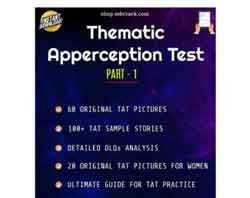With our hectic schedules in this bustling mundane life, it might be difficult to find time to think about who we are, our strengths and weaknesses, our drives and personalities, our habits and values. Besides, many of us just aren’t inclined to spend much time on self-reflection.
Lack of personal feedback from the outside world (family, friends/colleagues, boss etc.) can end in a pretty low level of self-awareness. That’s unfortunate because self-awareness is an essential first step toward maximizing personality traits and skill development. Self-awareness can improve our judgment and help us identify opportunities for professional development and personal growth.
As a matter of fact, the Self Description Test (SDT) in SSBs requires you to give honest opinions about yourself, from the point of view of your parents, teachers, friends, subordinates, colleagues, and your own feedback. And it is absolutely imperative to have a proper self-awareness before taking this test because the psychologist is curious to know whether you are aware of your strengths, weaknesses, qualities, shortcomings, etc. or not, so only to determine your temperament, selfdom and the vision you carry for yourself.
For this test, you need to have feedback and opinions collected from your family, friends, colleagues, employers beforehand. Getting direct feedback can be difficult. People want to make other people feel good (for the most part), and often times asking someone directly for their genuine opinions, we do not always get that honesty we are looking for. Even when personal feedback is presented to us, we’re not always open to it, because honest feedback isn’t always flattering! 😉
While it’s great to hear about things our acquaintances think you are good at, it’s way more useful to hear about some of the areas that you could improve. Let’s discuss few steps to get strong, unbiased feedback from our associations.
- Create a mindset for yourself that feedback is a gift: First of all, get this in your mind right away that if you can’t take constructive criticism positively, you are on the sure path of loserdom! All feedback conversations have one simple goal: to help us grow in our self-awareness and be more successful. The truth is that one cannot change you as a person without your consent. We can only give you information that will be helpful. From there it is up to you to decide. This takes the pressure off the giver and the receiver of the feedback. If you have open, trusting relationships with your family, friends, employers, etc. you tend to receive more valid, accurate assessment of your personality.

A powerful exercise designed to give you reliable and unbiased feedback as a person can be like the one discussed below where we have a few questions that are required to be answered:
- What am I good at
- What am I not so good at
- What three adjectives describe my best traits
- What three adjectives describe my worst traits
- What role do I play in people’s lives
- What improvements I must incorporate request your friends, family, peers to give a response. Ask for brutal harshness but then celebrate it. Compare the consistency of the feedback from person to person. This will give you an analysis of your strengths and weaknesses. If your friends tell you the same thing as your boss/coworkers that means your problem areas permeate in one direction wherein you need to make considerable efforts to improve.
2. Ensure that all feedback starts with strengths: Strengths help us to be successful. Ask the feedback giver what helps you be successful in achieving the results you have achieved so far and how can you continue it or what motivates you to do well in life. You may be tempted to spend less time on strengths but take it as seriously as the other points. Don’t let humility get in the way of really knowing yourself and your impact. Moreover, it allows you to motivate yourself and manage your stress better, helps you with your intuitive decision making, and helps you to lead and motivate others more effectively.
3. Dig deep for examples of behaviors: Ask the feedback giver for context. Don’t settle for “you’re a good communicator”. Ask probing questions like, “When did you see me doing that well OR Why do you think I am a good communicator?”. Equally, don’t settle for “You need to develop more leadership presence”. Ask “What behaviors do you see in others that are examples of good leadership presence and which I don’t presumably possess?” Do your best to be curious rather than defensive. This will also be beneficial for your interview because the Interviewing Officer has already read your Self-description and PIQ just before your interview session and he would definitely be curious to probe further to know the underlying truths. So it’s better to be well prepared and have all covered!
4. Get feedback from your boss, peers/colleagues, coworkers, teachers to create a 360-degree feedback loop. Get feedback from anyone who you have ever worked with and impacted, the teachers who taught you the most recent, your friends and other acquaintances who are close to you. Just meet them informally and get their input, not a cumbersome task at all.
5. Already identify a problem or lacking area and take some (even small) action on it before asking for advice: Before asking for other’s opinions, first, note down your own thoughts and opinions about yourself.
6. Acknowledge: One of the most important steps in the feedback process is responding appropriately. Not all suggestions you receive will be helpful or even relevant but if you stand any chance of continuing an honest feedback loop, you’ll have to make sure that you acknowledge other’s efforts in helping you with your appraisal without getting critical of who said what and embracing it willingly.The information shared above may not be new to you. What’s next is up to you. What’s at stake for you is your career and growth. Be realistic and impartial in your conclusions.















